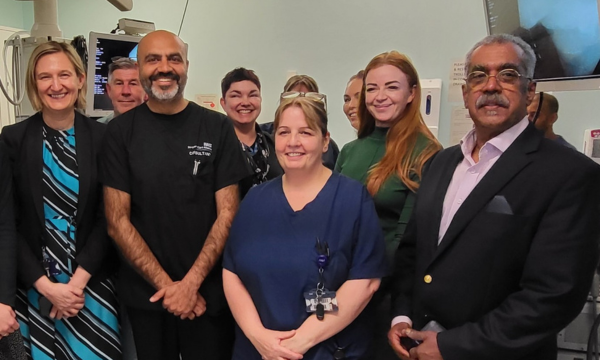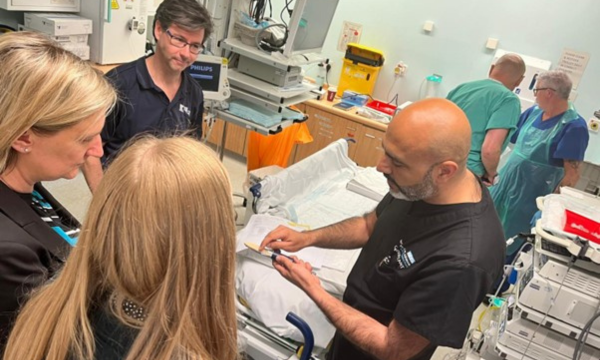Multiple doctors already working through regular weekly SSD lists after significant order.
Creo Medical Group plc (AIM: CREO), the medical device company focused on the emerging field of surgical endoscopy, announces that The Royal Oldham Hospital is the latest NHS England hospital to become a high-volume site for Speedboat Inject, with the device supporting their goal to prevent and treat bowel cancer.

Having recently completed simultaneous training of multiple doctors through Creo’s Pioneer clinical education and mentoring programme, the hospital has quickly ordered and taken delivery of several CROMA Advanced Energy platforms, Speedboat Inject devices and associated endotherapy products, before putting in place weekly lists for multiple SSD (Speedboat Submucosal Dissection) cases and the associated routine ordering of equipment to support these services.
As part of Creo’s Pioneer Clinical Education Programme in late April, three doctors at the Royal Oldham each performed their first in-hospital SSD procedures using Speedboat Inject, with a total of five cases successfully completed during a single afternoon. The Royal Oldham’s CEO and Managing Director of Surgery were present to witness Creo’s technology and the hospital’s endoscopy team has since successfully performed over a dozen further cases. The service has been supported by high quality mentoring from Creo Medical, enabling new trainees to transition easily into regular users.
Creo Medical expects to see continued high usage by the three new physicians as they support the Trust as it tackles NHS waiting lists cost effectively. SSD has already provided savings of up to £10k per procedure compared to the surgical alternative. Most importantly, this should help hundreds of patients per year to avoid more invasive procedures and the complications that can come with them.

The Royal Oldham Hospital is the twenty-third NHS England healthcare setting to adopt SSD, with twelve now high-volume users. Creo Medical conservatively estimates that there are over 350 hospitals in the UK whose patients could benefit from Speedboat Inject and the associated SSD procedure.
Dr Sal Khalid, Consultant Gastroenterologist at the Royal Oldham Hospital said:
“I am delighted that we will be able to provide this state of the art, safe and effective treatment for our patients at their local hospital. This is a great step forward in the treatment we provide with the technique reducing the chances of recurrence following the removal of a lesion from 15 percent to 1 percent.
“This procedure will help us with our goal towards prevention, early detection and treatment of bowel cancer.
Dr Regi George, Gastroenterologist at The Royal Oldham Hospital added:“I have been doing advanced procedures over many years and have used most of the current monopolar knives available in the market both in the upper and lower GI tract.
“However, the Speedboat device is a game changer. This is a safer technology and allows much deeper submucosal dissection. We are now moving on to use this as our preferred and only device for endoscopic dissection.
Craig Gulliford, Creo Medical CEO said:
“I am really pleased to see the team at The Royal Oldham Hospital become the latest adopters of Speedboat Inject.
“Our business strategy, focussed on training and mentoring, has been very clear and honed in particular after the COVID pandemic. For a hospital such as Oldham to be enrolling multiple doctors into our Pioneer Education program simultaneously and then immediately cementing this commitment with weekly patient lists across multiple endoscopy rooms backed up with product ordering in place is a great demonstration of the progress that we are making. It also reinforces what we are beginning to also see elsewhere – that the establishment of multiple services with our advanced energy platform and single use devices helps accelerate the scale at which patients benefit from the technology, alongside the associated business this creates for Creo Medical.
Luis Collantes, European President of Creo, added:“This latest contract further demonstrates the excellent progress hospitals such as Royal Oldham are making in understanding and implementing the advantages of our advanced energy technology, ensuring the benefits to patients and hospitals are maximised with the best service possible by offering high quality endoscopy solutions. It’s exciting to see Creo Medical become a complete solution for excellent services like this one at Royal Oldham.




